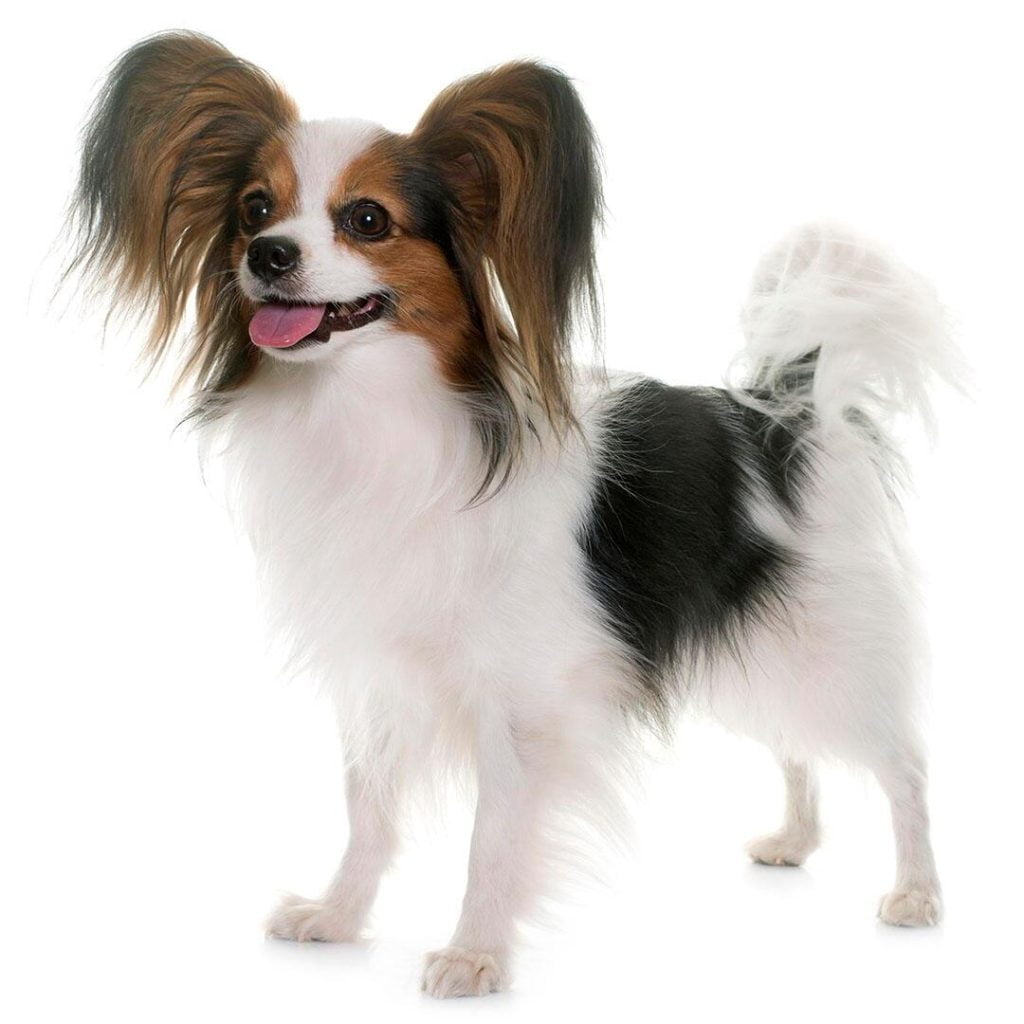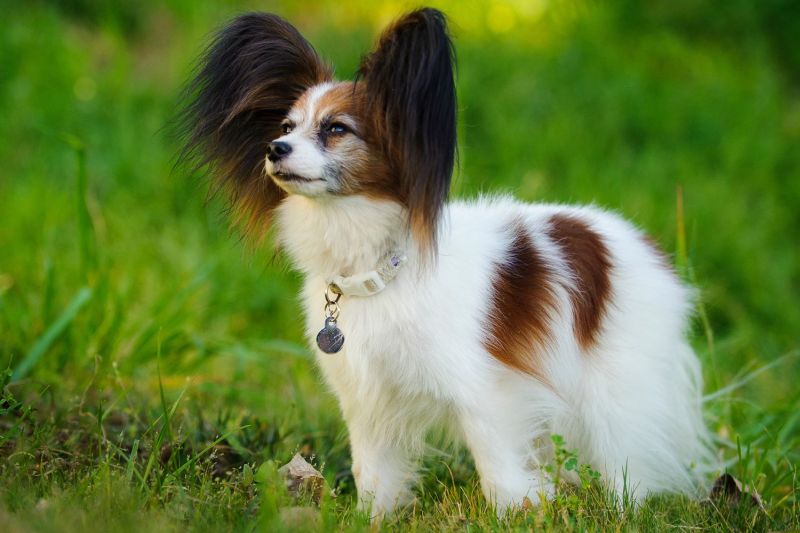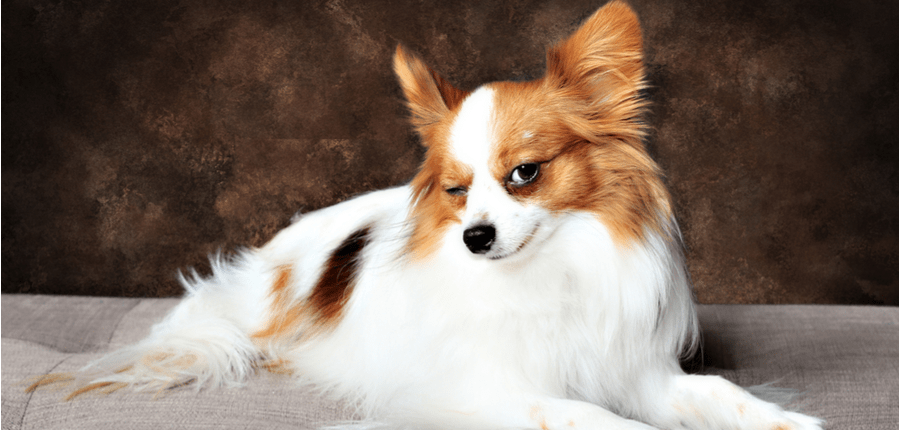
Did you know that Papillons are one of the popularly painted dogs by artists like Rembrandt, Rubens, and Goya?
This is because Pap was a favorite lap-warmer among female nobles in Europe like Madame de Pompadour and Marie Antoinette.
This 8 to 11-inch toy dog owes its name to the French who labeled it for its butterfly-like ears. Paps are agile and highly trainable, having a spaniel heritage, which makes them good sporting dogs.
Contents
One-Time Expenses for Papillon
- Getting Your Papillon
Papillon price ranges from $800 to $3,000 for puppies, depending on the reputation of the breeder, the puppies’ bloodline, club registration, as well as vet care.
If you would like a Pap from a certified breeder, however, you may need to check out the litters of Paps registered in American Kennel Club (AKC), or The Papillon Club of America.
Another way to get a new Pap friend is through adoption, which may cost you from $150 to $450, depending on the age. You may also opt to get senior dogs and Paps with “special needs”, which may require only some donation rather than a particular amount.
- Shelter
Papillons, being tiny dogs, are good indoor pets so giving them dog beds and bedding is recommended. Bed price ranges between $15 and $64, while beddings and pillows can cost from $5 to $37.
- Registration
If your newly-acquired Pap is not yet registered, you may have your canine friend registered at AKC for at least $30. Higher registration packages may include additional services like microchipping, pet insurance, and free initial appointment vet visits.
Contingent Expenses
Depending on the source of the Pap, these two expenses may be included the purchase of the pet. Otherwise, please include them in the budget:
- Microchipping
Papillons are tiny dogs that are friendly and adventurous. They are also attractive and easy to carry, so microchipping would be a good way to ensure that you get to keep track of your canine friend’s whereabouts.
AKC’s registration packages labeled silver or higher include microchipping services already, but if your doggie dog has not acquired one yet you can get it for as low as $5.
- Spaying and Neutering
Spaying and neutering are a way to ensure that more dogs enjoy a healthier and happier lifestyle. Each year, in the US alone, millions of pets, including dogs, are killed in pounds and shelters as more pets are abandoned or neglected.
Neutering costs $74 to $199, while spaying costs about $110 to $262. By having your dog spayed or neutered, you are helping the community in controlling the canine population so that more dogs have access to caring and responsible owners.

Recurring Costs for Owning Papillons
- Diet
High-quality dog foods for small dogs are recommended for Papillons. Eukanuba Small Breed Adult Dog Food costs around $28 for a 15-lb. pack, while a Pedigree brand costs around $13. You may also give home-made dog food with the doggo’s veterinarian approval.
- Grooming
Papillons have long silky fur but do not have an undercoat. This means that regular grooming for your Pap can be every other month. This includes nail clipping and regular toothbrush, while everyday care includes brushing to make sure that your furry friend does not get matted fur.
Slicker brushes which cost as little as $3.50 are ideal for regular fur brushing. You may also acquire a grooming set which may cost around $35. Grooming salon services, on the other hand, cost around 35 to $152, depending on the package or combo.
- Vaccination and Booster Shots
One of the first things your furry friend needs especially at a young age is vaccination. This not only ensures a healthy doggie but also grants you safety measures against human-endangering viruses such as rabies.
Booster shots, on the other hand, are supplementary shots given to adult dogs that strengthen the vaccine your canine pal got when it was still a pup.
Vaccinations for your Pap pup may be as low as $21. If you got your Pap from the shelter, you just need to consult and confirm with the shelter regarding future vaccinations for your canine pal since there is a high possibility that the dog’s vaccination has already been updated before release.
- Health and Insurance
Papillons are hardy canines – they can live up to 14 to 16 years. In order to maximize their lifespan, Paps have to be well taken care of through a regular vet visit. Cost for vet visits ranges between $24 and $44, depending on the examination coverage.
There are cases, however, when emergency care, surgery care, or medicine intake is required; in which case vet hospital fees can cost at least $14 per day, while medication can be at least $4.40 daily.
Surgery, on the other hand, may require around $58 for pre-operation procedure alone, with surgical procedures at around $199 or higher, depending on the procedure involved.
Because of the vet costs pets like your Pap may have, you may need to acquire insurance to help lessen the burden of these expenses. Insurance may range between $34 and $40 per month, depending on the company, branch, and location of your preferred insurance company.
- Travel
A good thing about having Papillon is it’s easy to carry and travel with because of its size. You may carry your Pap in small cages that cost about $20, but you may also opt to put it in doggie carriers and slings for as low as $14.
Air travel may require you to consult with your airline regarding canine pet accommodations. Although Paps are hardy creatures, they prefer their human companion so it would be better to carry them with you.
Another option for air travel would be to employ a pet-friendly traveling agency. Agencies like Happy Tails Travel provide pet travel service for as low as $450, depending on flight destination and other add-on services.
More About Papillons
Not all Paps have erect ears – the Phalene type has ears down. Papillons have plumed tails and long white-based silky coats that may come in many colors.

Papillons tend to forget their size; so they if they play outdoors, they might have a run-in with cats and larger dogs. They may also chase after squirrels, chipmunks, and insects. But Papillon puppies can already be trained to track despite their small sizes.
